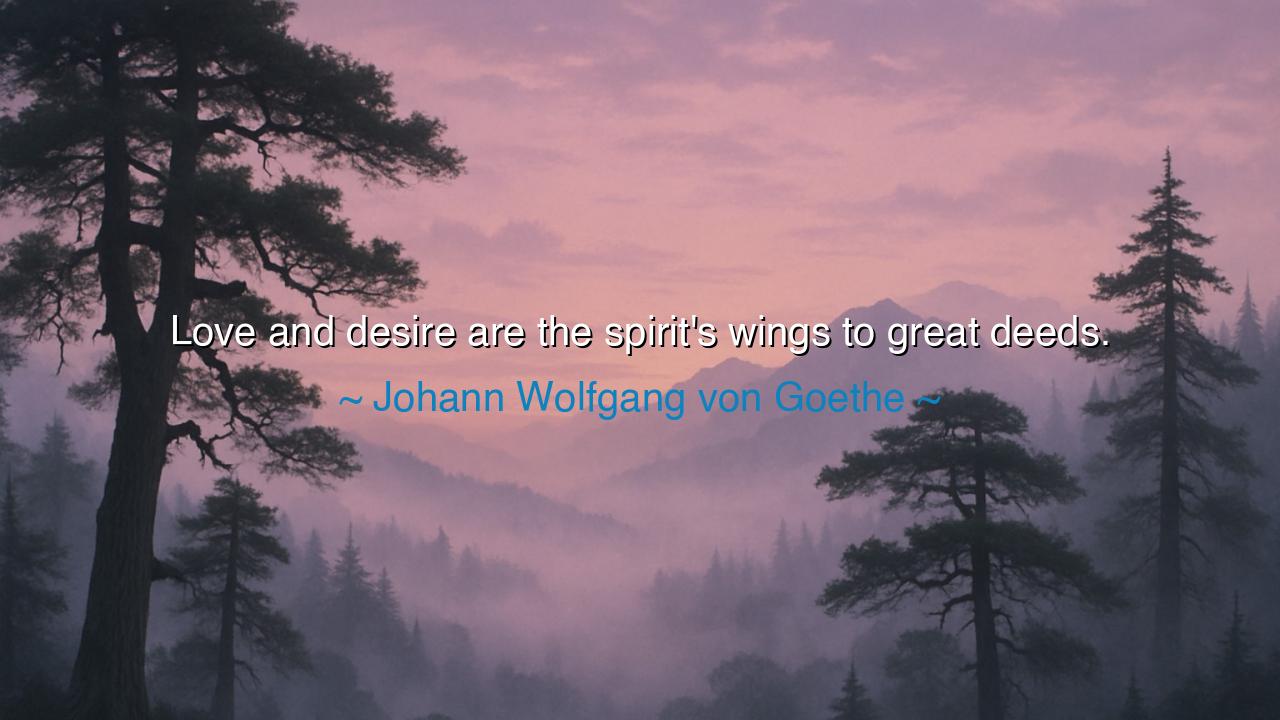
Love and desire are the spirit's wings to great deeds.






“Love and desire are the spirit’s wings to great deeds.” — so declared Johann Wolfgang von Goethe, the poet of souls and seer of human destiny, whose words gleam with the light of eternal truth. In this saying, Goethe unveils a sacred mystery of life: that it is not duty alone, nor intellect, nor even will that lifts humanity toward greatness, but the twin fires of love and desire. These are the wings of the spirit, invisible yet mighty, that raise the human being from the dust toward the heavens. Without them, we may labor, but we cannot soar; we may live, but we cannot truly create.
To the ancients, such a truth was known through myth and song. They spoke of Eros, the divine power of love, as the force that shaped the cosmos — for even the gods themselves moved in the dance of longing. Goethe, wise in the ways of the heart, echoed this eternal understanding. He saw that love — whether for another soul, for truth, for beauty, or for creation itself — gives life its motion and meaning. Desire is the flame that transforms thought into action, dream into reality, potential into greatness. When the heart burns with love, the spirit finds wings; it rises above fear and doubt, daring to achieve what reason alone could never command.
Goethe lived what he taught. His own life was one of constant striving, not for wealth or fame, but for the unfolding of the spirit. He wrote of love’s rapture and pain, of the divine longing that shapes all art and endeavor. From Faust to The Sorrows of Young Werther, his works reveal that love and desire are not weaknesses, but the very breath of creation. To him, a life without passion was a body without a soul. For he understood that every act of greatness — every poem written, every cathedral built, every act of courage born — begins first in the quiet spark of the heart.
Consider, for instance, the story of Florence Nightingale, who defied the expectations of her age to become the mother of modern nursing. She was not driven by duty alone, but by love — love for humanity, for the suffering, for the sanctity of life itself. Her desire to bring healing became the wing that carried her through the darkness of war, through the stench of disease, through the weight of exhaustion. It was love that made her fearless, and desire that made her unstoppable. In her compassion burned the same truth Goethe spoke of: that love, when pure and fierce, transforms ordinary mortals into instruments of the divine.
This, then, is the heart of Goethe’s teaching: that love and desire are sacred powers — the energy of the universe made manifest within the human soul. Without love, the spirit falters; without desire, it grows cold. Yet when both burn together — when love refines desire into purpose, and desire strengthens love into action — man becomes a creator, a hero, a light in the world. These forces must be guided, yes, for unbridled desire can destroy, and blind love can deceive. But when joined in harmony, they give flight to the noblest deeds of the human race.
In our age, many confuse comfort with peace, and distraction with joy. They have forgotten that the soul was born to long, to reach, to love deeply and strive greatly. Goethe’s words call us back to that forgotten truth. They remind us that it is better to love and fail than to live untouched by passion; better to desire greatly and stumble than to drift in complacency. For in the fire of the heart, even suffering becomes sacred, shaping the spirit into strength.
So, my child, hear this and remember: love is your compass, and desire your wings. Let your heart be stirred by beauty, by justice, by compassion. Do not fear to feel deeply, for it is through feeling that the soul learns to fly. Channel your desires toward creation, not destruction; let them drive you to build, to serve, to dream. And above all, love — love life, love truth, love others — for in that love lies the very power of the divine within you.
Thus Goethe’s words endure, bright as flame: “Love and desire are the spirit’s wings to great deeds.” For without wings, the spirit crawls upon the earth — but with them, it ascends to the stars, carrying with it the light of all that is noble, eternal, and divine.






AAdministratorAdministrator
Welcome, honored guests. Please leave a comment, we will respond soon